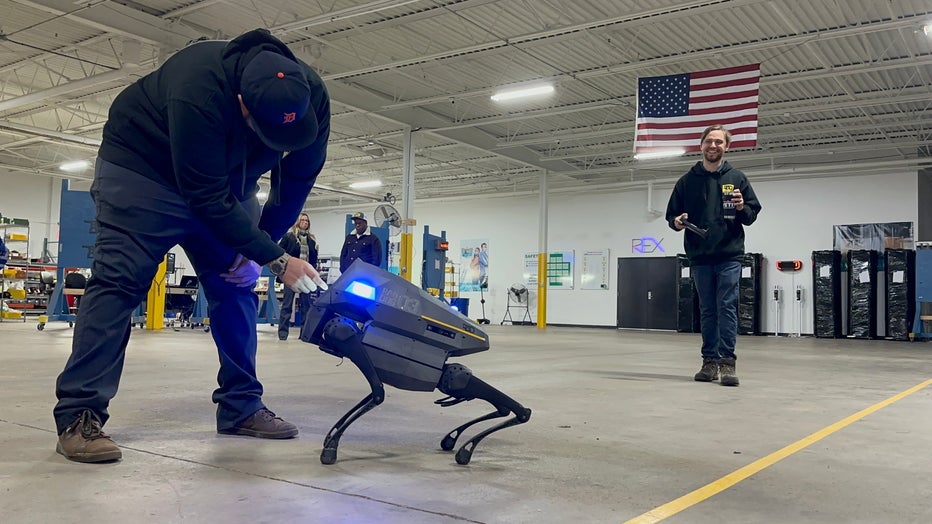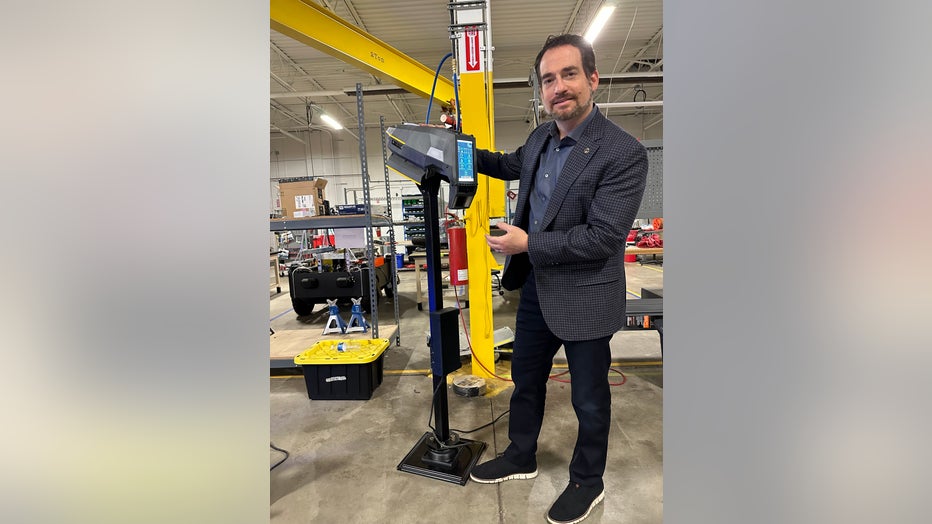Robot guard dog unleashed in Ferndale
Robot dog demonstrations in Oakland County
The next security personnel you come across may not be a person at all, but a robotic dog that's connected to a security network. The RADDOG, developed by Robotic Assistance Devices, even comes with a 'follow-me' function and can be used for tracking trespassers.
FERNDALE, Mich. (FOX 2) - The latest security device to hit the market has four legs and stands about a foot off the ground - kind of like a dog.
But that's where the canine similarities stop for the RADDOG, as does people's comfort level when they're standing near it.
"When you see something that drives around, you say ‘oh cool. Robotics.’ But when you see something like (the robotic dog), especially when you tilt its head up, people get just get uncomfortable," said Luke Ross, the vice president of production at Robotic Assistance Device.
That's just when it walks. But when it runs is when people get really nervous.
Of course, if someone comes across the Robotic Assistance Devices (RAD) security dog - it likely won't be under friendly circumstances. After all, it's not meant to be pet.
"It's totally cool, isn't it?" said Steven Reinharz, who is the CEO of RAD and its parent company Artificial Intelligence Technology Solutions (AITX). "The intention of our company is to create a network. A connected network that includes stationary devices, mobile devices, and airborne devices."
AITX has already built several technologies that help monitor businesses, deter petty crimes like loitering and vandalism, and remotely detect firearms. The robotic dog rollout pushes the company into a new phase of security.
It works in tandem with another technology the company has built: ROSA or Responsive Observation Security Agent. It looks like a large black panel with a camera inside that's placed on the wall high up over an entrance or exit to a building.

Luke Ross presses on the display pad of the RADDOG. (Photo credit: Jack Nissen)
When an unidentified person is detected on the property, the overhead camera will dispatch the robot dog which will seek out the individual. It even comes with a tracking function that allows it to follow an intruder.
"ROSA can call out the RADDOG, the dog comes up, follows the guy around until it reaches a geo-fenced area, then the dog stops," Reinharz said.
Except for the prosthetic legs, everything built into the robotic dog is developed by engineers at AITX - a fact that Reinharz prides himself on. Rather than purchase the analytics from another company, AITX's products use code written by its own employees. That way the company has complete control over it.
"We're not reliant on anyone else," Reinharz said. "For us, it's the only way to move forward since none of this stuff existed before we built it."
MORE: Ancient life, rare plants found in Michigan's sinkholes
They may be new technologies, but the jobs they're built for aren't.
After the products are developed at the company's headquarters in Waterloo, Ontario, they're shipped to a facility in Ferndale. From there, they are sent to businesses serving at logistic center checkpoints and car dealerships.

CEO Steve Reinharz with the technology backpack that goes on the RADDOG's prosthetics.
The machines are often built to fill the need of a customer, Ross said.
The first piece of tech that was available to customers was a tall black-colored monolith with a camera inside called a SCOT. That got the job done, Ross said, but then customers said they needed something to go on a wall.
That's when WALLY hit the market for jobs like health care screening.
"Well, then people needed the cameras high up, which is where ROSA came from," Ross said. "That was by far our best-selling product." After ROSA came AVA, which could be used in place of a security guard at a gate entrance into a place of business.
The company has also released units that run on wheels, but it's the quadruped that has the company excited. By adding a mobile dimension to its security, AITX says it can take over more of the tasks that have historically been done by people.
Reinharz stresses the systems don't remove people completely from the process. It's expected to do most tasks automatically, but for the cases that prove to be an exception - someone will be available.
"We want the system to handle as much work autonomously, but still offer a premium service as a human," he said. "We want to elevate people out of lousy jobs and into higher-level jobs."

